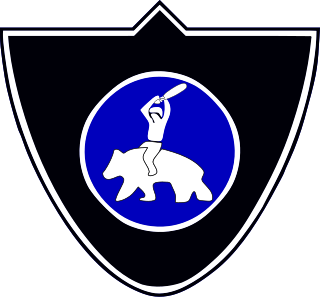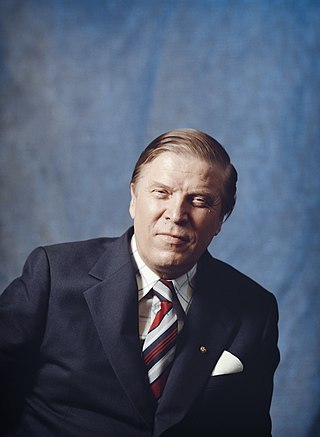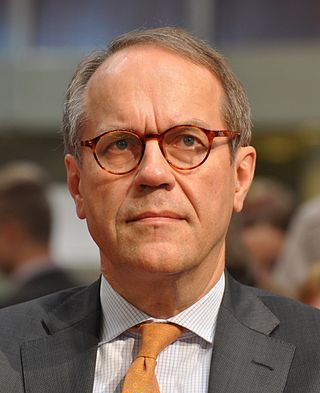
Urho Kaleva Kekkonen, often referred to by his initials UKK, was a Finnish politician who served as the eighth and longest-serving president of Finland from 1956 to 1982. He also served as prime minister, and held various other cabinet positions. He was the third and most recent president from the Agrarian League/Centre Party. Head of state for nearly 26 years, he dominated Finnish politics for 31 years overall. Holding a large amount of power, he won his later elections with little opposition and has often been classified as an autocrat.

The Centre Party, officially the Centre Party of Finland, is an agrarian-centrist political party in Finland. Ideologically, the Centre Party is positioned in the centre of the political spectrum. It has been described as liberal, social-liberal, liberal-conservative, and conservative-liberal. The party’s leader is Antti Kaikkonen, who was elected in June 2024 to succeed former minister Annika Saarikko. As of June 2023, the party has been part of the parliamentary opposition.

Patriotic People's Movement was a Finnish nationalist and anti-communist political party. IKL was the successor of the previously banned Lapua Movement. It existed from 1932 to 1944 and had an ideology similar to its predecessor, except that IKL participated in elections with limited success.

Johannes Virolainen was a Finnish politician and who served as 30th Prime Minister of Finland, helped inhabitants of Karelia, opposed the use of alcohol and created Mandatory Swedish in Finnish basic schools.

Finnish Centre Youth Finnish: Keskustanuoret is the biggest political youth organisation in Finland with 17 000 members. It is the youth wing of the Centre Party. It is formed by 19 regional organisations and approximately 400 local associations.

Swedish Youth is a political youth organization in Finland. It is the youth wing of the Swedish People's Party of Finland. The organisation claims 2,500 members. It was founded in 1943.

Finnish People's Democratic League was a Finnish political organisation with the aim of uniting those left of the Finnish Social Democratic Party. It was founded in 1944 as the anti-communist laws in Finland were repealed due to the demands of the Soviet Union, and lasted until 1990, when it merged into the newly formed Left Alliance. At its time, SKDL was one of the largest leftist parties in capitalist Europe, with its main member party, the Communist Party of Finland, being one of the largest communist parties west of the Iron Curtain. The SKDL enjoyed its greatest electoral success in the 1958 parliamentary election, when it gained a support of approximately 23 per cent and a representation of 50 MPs of 200 total, making it the largest party in the Eduskunta.

Jorma Jaakko Ollila is a Finnish businessman who was chairman of Royal Dutch Shell from 1 June 2006 to May 2015, and at Nokia Corporation chairman from 1999 to 2012 and CEO from 1992 to 2006. He has been a director of Otava Books and Magazines Group Ltd. since 1996 and UPM-Kymmene since 1997, and an advisory partner at Perella Weinberg Partners, a New York–based boutique investment bank founded by Joseph R. Perella and Peter Weinberg in 2006.

Ahti Kalle Samuli Karjalainen was a Finnish economist and politician. He was a member of the Agrarian League and served two terms as Prime Minister of Finland. He is, however, better known for his period as Minister of Foreign Affairs of Finland. Karjalainen is considered one of the most influential figures in post-war Finnish politics. Like President Urho Kekkonen, Karjalainen attached great importance to Finland's relationship with the Soviet Union, and was at one point considered to be Kekkonen's likely successor until alcoholism affected his later career.

Tamminiemi is a villa and house museum located in the Meilahti district of Helsinki, Finland. It was one of the three official residences of the President of Finland, from 1940 to 1982. From 1956, until his death in 1986, it served as the residence of President Urho Kekkonen. Since 1987, it has been the Urho Kekkonen Museum. Tamminiemi is located in a park by the sea. Its floor area is about 450 square metres (4,800 sq ft); living quarters comprise the first two floors while the third floor is dedicated to office space.
Parliamentary elections were held in Finland on 6 and 7 July 1958. The communist Finnish People's Democratic League emerged as the largest party, but was unable to form a government.
Parliamentary elections were held in Finland on 15 and 16 March 1970.
Parliamentary elections were held in Finland on 2 and 3 January 1972.
Parliamentary elections were held in Finland on 21 and 22 September 1975.
Parliamentary elections were held in Finland on 18 and 19 March 1979.

Karl-August Fagerholm's third cabinet, also known as the Night Frost Cabinet or the Night Frost Government, was the 44th government of Republic of Finland, in office from August 29, 1958 to January 13, 1959. It was a majority government. The cabinet was formed after the parliamentary election of 1958.

The Finnish Rural Party was an agrarian and populist political party in Finland. Starting as a breakaway faction of the Agrarian League in 1959 as the Small Peasants' Party of Finland, the party was identified with the person of Veikko Vennamo, a former Agrarian League Member of Parliament known for his opposition to the politics of President Urho Kekkonen. Vennamo was chairman of the Finnish Rural Party between 1959 and 1979.

The Night Frost Crisis or the Night Frost was a political crisis that occurred in Soviet–Finnish relations in the autumn of 1958. It arose from Soviet dissatisfaction with Finnish domestic policy and in particular with the composition of the third government to be formed under Prime Minister Karl-August Fagerholm. As a result of the crisis, the Soviet Union withdrew its ambassador from Helsinki and put pressure on the Finnish government to resign. The crisis was given its name by Nikita Khrushchev, who declared that relations between the countries had become subject to a "night frost".
For Independence was a right-wing political organization operating in Finland in the 1970s and 1980s, which opposed the influence of the Soviet Union in Finland, the policy of President Urho Kekkonen and socialism.

Kaarlo Henrik Hillilä was a Finnish politician who served as the provincial governor of Lapland (1938–1947), head of the market town of Rovaniemi, minister of the interior (1944–1945), minister of supply (1945–1946), and director general of the Social Insurance Institution (1946–1954).














